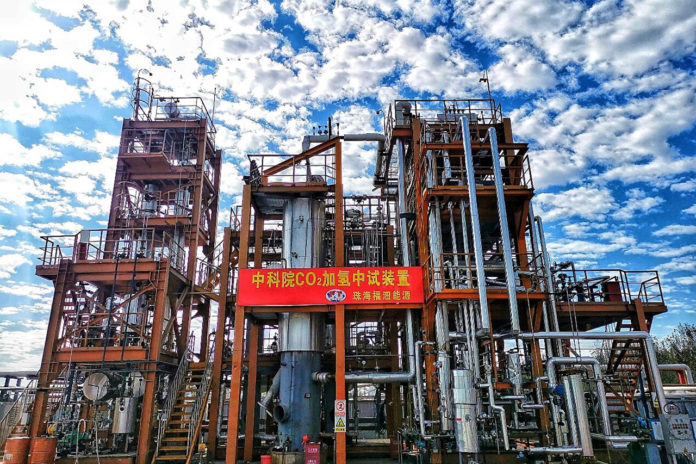The world’s first demonstration device to produce 1,000 tons of gasoline per year from carbon dioxide (CO2) hydrogenation has completed its technology evaluation and trial operation.
Located in the Zoucheng Industrial Park, Shandong province, China, the project has been jointly developed by the Dalian Institute of Chemical Physics (DICP) of the Chinese Academy of Sciences (CAS) and the Zhuhai Futian Energy Technology company. The hydrogenation of CO2 into liquid fuels and chemicals can not only realize the resource utilization of CO2 but also facilitate the storage and transportation of renewable energy.
However, activation and selective conversion of CO2 are challenging. A technology that can selectively produce energy-dense, value-added hydrocarbon fuels will provide a new route to promote the clean, low-carbon energy revolution.
The carbon dioxide-to-gasoline hydrogenation technology was proposed by SUN Jian, GE Qingjie, and WEI Jian from DICP in 2017, with a paper published in Nature Communications. The technology uses metal catalysts to convert carbon dioxide into biofuels that are less harmful to the environment.
The demonstration facility was completed in Zoucheng Industrial Park in 2020. In October 2021, the device passed the continuous 72-hour on-site assessment organized by the China Petroleum and Chemical Industry Federation (CPCIF). It could realize 95% carbon dioxide and hydrogen conversion 85% gasoline selectivity in all carbon-based products, with reduced consumption of the raw material of CO2 and H2.
It produced a clean and green gasoline product with an octane number above 90 according to the Chinese standard, accompanied by low energy consumption throughout the process.
“This technology marks a new stage of CO2 resource utilization technology in the world and provides a new strategy for realizing the goal of carbon-neutral,” said Prof. SUN.
